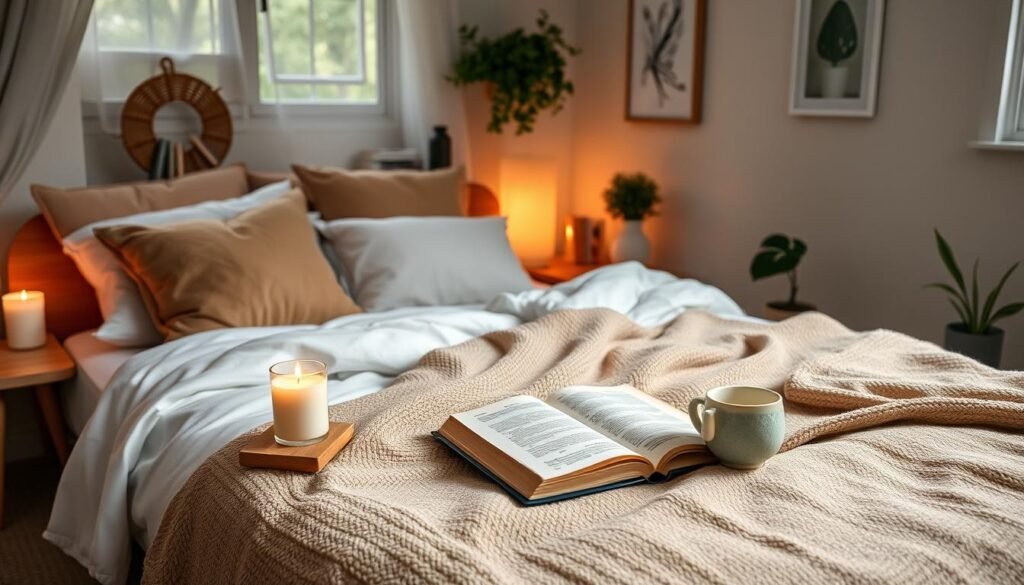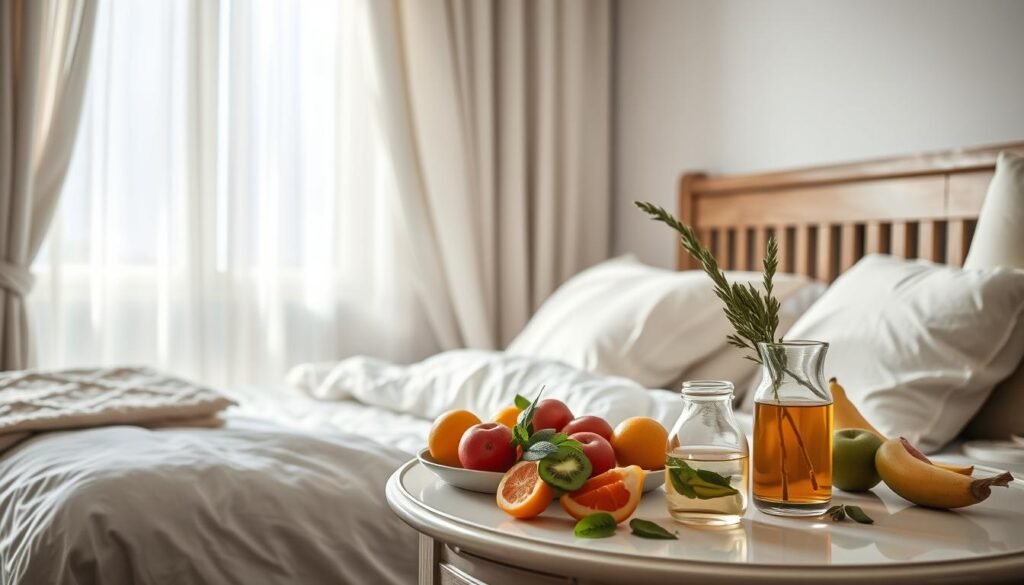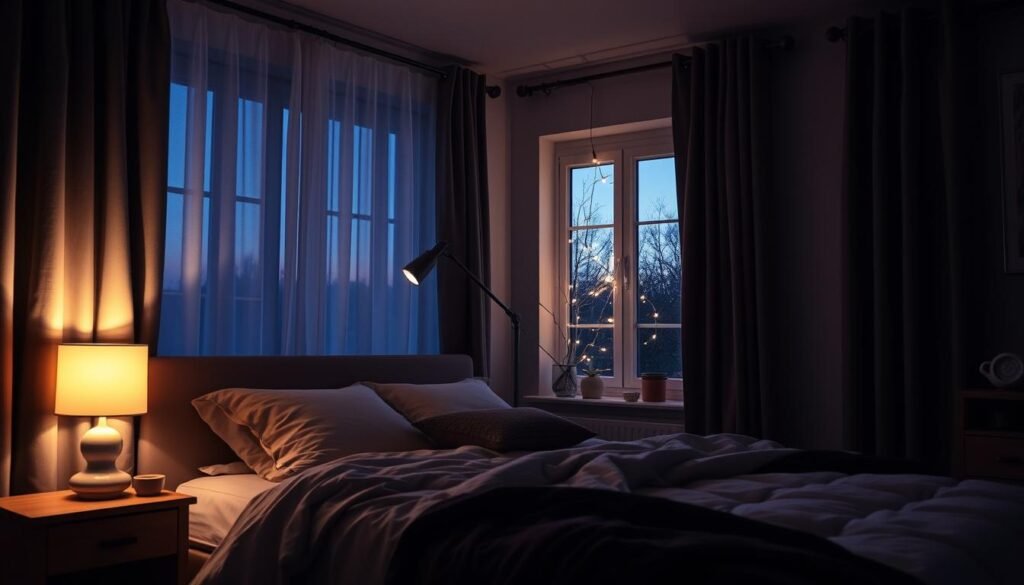Nearly one in three adults don’t get enough sleep at night. This shows we need better sleep habits now. Good sleep is vital for our health and happiness. By sleeping well, we improve our lives and health a lot.
Want to sleep better? This article has tips to make a great bedtime routine. Learn about sleep hygiene and keeping a sleep schedule. These tips will help you rest well and wake up refreshed. Start valuing sleep more to change your nights for the better.
Key Takeaways
- Consistent sleep schedules significantly improve sleep quality.
- Exposure to daylight for at least 30 minutes daily helps align the circadian rhythm.
- Practicing relaxation techniques reduces stress and sleep disruptions.
- A diet rich in fruits and vegetables contributes to better sleep health.
- Creating a calming pre-bed routine enhances sleep readiness.
- Limiting daytime naps to 20 minutes prevents interference with nighttime sleep.
- Maintaining a comfortable bedroom environment is crucial for restful nights.
Understanding Sleep Hygiene
Sleep hygiene means following habits that lead to good sleep every night. Doing things like choosing the right foods, setting a bedtime routine, and planning your schedule wisely can improve how well you sleep. These actions are key in picking habits that boost your sleep quality.
What is Sleep Hygiene?
Sleep hygiene is about habits and the setting that help you sleep better. It involves sticking to a sleep schedule, making your sleeping area peaceful, and doing relaxing activities before bed. By avoiding certain foods that harm sleep, such as dairy or sugar, you can sleep better. Learning about sleep hygiene shows that a good bedtime routine not only helps with sleep but also with overall health.
Why Sleep Hygiene Matters
Good sleep hygiene is crucial for managing sleep well. Bad sleep habits can hurt mental and physical health, causing more anxiety and depression. Trouble sleeping often comes from not having a regular sleep time. Since 20 to 30 percent of people say they don’t sleep well, making a solid sleep routine is needed. A good sleep routine keeps health problems at bay.
Building Healthy Sleep Habits
What we do every day matters for our sleep. A good routine with exercise and sunlight helps us sleep better. Being active for about 30 minutes on most days is key. It boosts sleep and keeps us healthy.
Daily Activities and Sleep
For better sleep, try these tips:
- Wake up at the same time every day, even on weekends.
- Cut down on caffeine and alcohol before bed.
- Relax with activities like reading or meditation in the evening.
- Avoid big meals right before bedtime to avoid discomfort.
- If you can’t sleep after 20 minutes, do something calm instead of lying in bed.
The Impact of Stress
Stress can ruin good sleep. It often leads to insomnia. Using techniques like cognitive-behavioral therapy (CBT) can help. Also, relaxing every day reduces stress’s effects on sleep.
Creating a calm space is crucial. A room that’s quiet, dark, and tech-free is best. Positive daily habits reduce stress and make our sleep better.
Establishing a Consistent Sleep Schedule
Having a consistent sleep schedule is key to a healthy life. It tunes your body’s internal clock, aiding in easier sleep. By sleeping and waking up at the same times every day, even on weekends, your sleep improves. This leads to the many perks of a steady routine.
Benefits of a Routine
A solid sleep schedule brings many benefits. Adults need at least seven hours of sleep for their best mental and physical health. Setting a sleep schedule boosts your overall well-being. Studies show that matching up with your body’s natural cycles results in better rest. Otherwise, you risk sleep issues and poor stress management. Regular sleep lets your body work its best all day.
How to Stick to Your Schedule
To keep a regular sleep schedule, you need commitment and a plan. Here are some tips to help:
- Create bedtime reminders to signal it’s time to start winding down.
- Gradually adjust sleep times after things like trips to suit your needs.
- Have a bedtime routine that includes calm activities like meditation or soft music.
- Exposure to natural light in the morning aligns your internal clock.
- Limit screen time before bed to reduce blue light’s impact.
Saying no to electronics 1-2 hours before bed can also create a peaceful setting for sleep. For more on establishing a good sleep routine, click here.
Creating a Relaxing Bedtime Routine
Starting a relaxing bedtime routine is key for good sleep. Doing calming things before bed tells your body it’s time to slow down. These habits help get your mind and body ready for a deep sleep. Adding regular tasks can also make a sleeping-friendly place. This is important for getting enough rest.
Activities to Include
There are many activities that can make your bedtime routine better. Here are some suggestions:
- Take a warm bath at least one hour before bed to promote relaxation by mimicking a drop in body temperature.
- Engage in gentle stretches or yoga to soothe the body and relax the mind.
- Read a book under soft lighting, preferably outside the bedroom to maintain a calm atmosphere.
- Practice mindfulness or meditation to reduce anxiety and improve sleep quality.
- Write a quick to-do list to clear the mind and make it easier to sleep.
Timing Your Routine
When creating a bedtime routine, timing is everything. Try to start your routine 30 to 60 minutes before bed. This makes moving into sleep easier. Set a regular bedtime alarm to keep track of when to begin. Sticking to a schedule helps with better sleep hygiene, making sleeping and waking up easier.

| Activity | Benefits | Recommended Timing |
|---|---|---|
| Warm Bath | Promotes relaxation by lowering body temperature | 1 hour before bed |
| Reading | Reduces stress and prepares mind for sleep | 30 minutes before bed |
| Meditation | Improves sleep quality and reduces anxiety | 10-15 minutes before bed |
| Gentle Stretches | Relaxes muscles and calms the mind | 15-20 minutes before bed |
| Writing a To-Do List | Clears thoughts, aiding in faster sleep onset | 15 minutes before bed |
Planning these activities at specific times helps make a bedtime routine that works for you. By doing this, you’ll see big improvements in your sleep and overall health.
Enhancing Your Sleep Environment
A good bedroom setup is key for deep sleep. Making changes can boost how well you sleep. Keeping the room cool, dark, and quiet is important. These factors make your bedroom better for sleeping. They also help you relax and get into a routine.
Optimal Bedroom Conditions
For a better sleep area, keep your room cool but comfy. Aim for 60°F to 67°F (15°C to 19°C). Cooler temperatures help you sleep more soundly. Make sure your room gets enough fresh air. Also, use blackout curtains to keep it dark.
Picking the right mattress and pillows is crucial. Try out different firmnesses and materials to see what feels best. An adjustable base can let you change sleep positions for even more comfort.
Minimizing Disruptions
It’s important to cut down on noise for better sleep. White noise machines can help block out sudden noises. Turn off gadgets at least 30 minutes before bed. This reduces screen distractions that mess with sleep.
Create a calm space by lowering noise and using soft lights before bed. Keep your bed just for sleep and close moments. This makes it easier to relax and fall asleep.
Prioritizing Restful Sleep Through Nutrition
Nutrition is key to getting good sleep. The right and wrong foods affect how well we sleep. By choosing the right foods and avoiding bad ones before bed, you can sleep better.
Foods to Avoid Before Bed
Some foods can mess up your sleep. Here’s what to stay away from:
- Sugary and caffeinated beverages: Too much sugar can wake you up at night. Caffeine keeps you awake for up to six hours.
- Heavy or fatty meals: Fatty or protein-rich foods before bed can ruin your sleep. They prevent deep, healing sleep.
- Spicy foods: They can give you heartburn and make your body too warm. This makes it hard to fall asleep smoothly.
The Role of Caffeine and Alcohol
Caffeine and alcohol greatly affect our sleep. Drinking caffeine late in the day can cause insomnia. This is more so for older people, as caffeine stays longer in their system. Meanwhile, alcohol may make you feel sleepy at first. But, it can cause you to wake up randomly and struggle to sleep again.
Choosing the right foods improves your sleep. Eating complex carbs like oatmeal helps with digestion and sleep. Foods rich in B vitamins like fish, legumes, and eggs regulate melatonin. This helps you sleep well.

| Food Type | Impact on Sleep |
|---|---|
| Sugary Foods | Increased awakenings during the night |
| Caffeine | Disruper lasting up to six hours |
| Fatty Foods | Less deep, restorative sleep |
| Spicy Foods | Causes heartburn, raising body temperature |
| Healthy Whole Grains | Promotes digestion, aids sleep |
Implementing Relaxation Techniques
Using relaxation techniques helps a lot in getting good sleep. Many adults, nearly one out of three, struggle with ongoing insomnia. To calm the mind and body, it’s crucial to add practices. Promoting good sleep are deep breathing and guided meditation.
Deep Breathing Exercises
Deep breathing is a natural method to lessen stress and encourage relaxation. The 4-7-8 technique is one effective way—inhale for four seconds, hold for seven, and exhale for eight. Taking around 10 deep breaths can slow down your breathing. This helps to calm your mind and body. Breathing exercises aim at reducing tension and anxiety, helping you sleep better.
Guided Meditation for Sleep
Guided meditation is another helpful method for peaceful sleep. Using mental images can relax your mind, making it easier to fall asleep. Also, yoga nidra, a type of meditative yoga, increases calmness and betters sleep quality. Complementing these, progressive muscle relaxation works by tensing and relaxing muscles systematically. Regular practice of these techniques, not just now and then, improves both emotional and physical health.
Limiting Daytime Naps
Naps can boost alertness and mood. But, knowing how to nap properly is key. Limiting daytime naps helps keep a healthy sleep cycle. We’ll look at the best nap lengths and times to improve sleep quality.
How Long Should Naps Be?
Keep naps short, between 20 to 30 minutes, for the best effect. Napping for more than an hour can be risky. It may lead to high blood pressure or diabetes. Short naps prevent sleep inertia, which makes you feel groggy.
Best Time for a Nap
The early afternoon is the best time for a nap. Avoid napping after 3 p.m. to not disrupt night sleep. Late or long naps can be harmful, so schedule wisely. Here are the key guidelines:
| Nap Duration | Effects | Recommended Timing |
|---|---|---|
| 20-30 minutes | Refreshes without grogginess | Early afternoon |
| Over 60 minutes | Increased health risks | After 3 p.m. (not recommended) |
To get the most from napping, find the right balance. If you feel you need more naps suddenly, see a doctor. It could point to health problems.
Engaging in Regular Physical Activity
Regular physical activity improves our health and our sleep quality. Activities like walking, cycling, or aerobics make our sleep better. After we exercise, our body cools down, which helps us get ready to sleep.
Exercise and Sleep Quality
Moderate aerobic exercise for 30 minutes improves sleep quality that same night. It increases slow-wave sleep which is important for rest. This kind of exercise also helps us fall asleep faster and spend less time awake in bed. Exercise releases endorphins, which may change how we sleep.
- Exercise helps with sleep problems.
- People who exercise feel less anxious and less sleepy during the day.
- Exercising regularly can lower the risk of insomnia and sleep apnea.
If late-night exercise affects your sleep, try exercising earlier. Some people sleep better after evening workouts. If workouts late disrupt your sleep, exercise 1 to 2 hours before bed.
Best Timing for Exercise
The right time to exercise can boost sleep quality. After exercising, you might feel more alert as your body is still warm. Sleepiness comes as the body starts to cool down. Consider your sleep habits and response to exercise when planning your activity times. Suggestions for timing include:
| Time of Day | Potential Impact on Sleep |
|---|---|
| Morning | Boosts overall energy; improves sleep cycle. |
| Afternoon | Enhances mood and focus; contributes to restorative sleep. |
| Evening | May hamper sleep for some; can promote deep sleep for others. |
Regular physical activity has many benefits, including better health and sleep quality. Consider how exercise timing affects your sleep patterns.
Managing Light Exposure
Managing light exposure is key for healthy sleep. Electronic devices emit blue light, which is a problem for our natural sleep. This light messes with melatonin, which helps control when we sleep and wake up. With good strategies, we can manage light and sleep better.
The Effects of Blue Light
Blue light comes from screens and some lights, affecting our sleep. At night, blue light stops melatonin and keeps us awake. It makes falling asleep tough, leading to tiredness and less sharpness in the day.
Strategies for Reducing Light Before Bed
There are several ways to cut down on light at night:
- Use warm light bulbs – Choose bulbs that give off a soft glow, making a relaxing space.
- Employ night mode settings – New devices let you reduce blue light, which is better for your eyes at night.
- Limit screen time – Avoid using phones, tablets, and PCs 30 minutes before sleeping.
- Engage in dim lighting – In the evening, opt for lamps and candles over bright lights.
- Cover windows – Use blackout curtains to keep out light from outside, like streetlights or headlights.
Following these tips can help control light exposure for better sleep. By making your space ideal for rest, your body can naturally prepare for sleep.

| Light Type | Impact on Sleep | Recommended Action |
|---|---|---|
| Blue Light | Disrupts melatonin production | Limit usage before bed |
| Warm Light | Promotes relaxation | Use in the evening |
| Dim Light | Supports winding down | Lower intensity as bedtime approaches |
| Natural Light | Regulates circadian rhythms | Seek during the day |
Know When to Seek Professional Help
It’s important to know when to get help for sleep issues. Sometimes, sleep problems are signs of deeper health issues. Knowing when to seek professional help is key.
Identifying Underlying Issues
Often, people think sleep problems are just temporary issues. But, they could point to something more. If you can’t sleep well, feel tired during the day, or notice mood swings, it might be time to seek help.
Children with lack of sleep might act like they have ADHD. This affects their learning. It’s important to spot these signs early. For more on good sleep habits, visit this resource.
When to Consult a Sleep Specialist
When sleep doesn’t improve with changes to routine, see a sleep specialist. They can figure out the problem and give personalized advice. They can treat sleep issues like sleep apnea or insomnia.
Specialists can help anyone, no matter their age, to get better sleep. If you’re struggling to sleep well, they can offer valuable advice. A calming routine before bed can also help. Don’t wait to get help for sleep problems.
Conclusion
Getting enough sleep is key to staying healthy and feeling good. Many adults in the U.S. don’t get enough sleep each month. It’s important to work on building better sleep habits.
Creating a bedtime routine and a calm sleeping area can really improve how well you sleep. These changes can make a big difference.
Good sleep helps you physically and mentally. It makes your mind clear and keeps your emotions stable. Not sleeping well can lead to health problems like heart disease. Quality sleep also improves your mood, decision-making, and coordination. This leads to a better life.
If you find it hard to sleep well, try relaxation methods or think about getting help from a professional. Realizing the importance of good sleep quality matters a lot. Making the effort to sleep better can change your life in amazing ways.